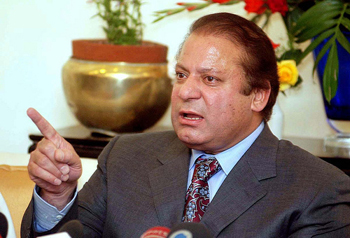New Delhi, Apr 20: The Pakistan Supreme Court on Thursday ordered the formation of a Joint Investigation Team (JIT) to probe PM Nawaz Sharif and his family's involvement in corruption in the Panama Papers case.
 In a split judgement, the court cited insufficient evidence to outright convict and remove Sharif from office.
In a split judgement, the court cited insufficient evidence to outright convict and remove Sharif from office.
A five-judge bench, comprising Justice Asif Saeed Khosa, Justice Gulzar Ahmed, Justice Ejaz Afzal Khan, Justice Azmat Saeed and Justice Ijazul Ahsan, delivered the landmark judgement after examining arguments presented in the case. The 540-page verdict was split 3-2 among the bench, with two dissenting notes in the judgement by Justice Khosa and Justice Gulzar, who said that Sharif should be disqualified.
Further, the court directed Sharif and his two sons - Hasan and Hussain - to appear before the JIT, which would consist of officers from different agencies. The investigative team has been given two months time to complete the probe into alleged corruption by the Sharif family.
The JIT will present its report before the bench after every two weeks.
The case was launched on November 3 and the court held 35 hearings before concluding proceedings on February 23.
The case was based on several identical petitions by Pakistan Tehreek-i-Insaf chief Imran Khan and others about alleged illegal assets of Sharif's family in London.
The assets surfaced when Panama papers - a collection of leaked documents - showed that they were managed through offshore companies owned by Sharif's offspring.
The petitioners had asked the court to disqualify 67-year-old Sharif under Article 62 and 63 of the constitution because he was involved in corruption.
Sharif 's supporters hailed the decisions as a victory of justice.
"We have been vindicated as Prime Minister had last year asked to set up a probe commission to investigate Panama leaks scandal," said Khawaja Asif, defence minister and close ally of Prime Minister Sharif .
Earlier, the area around the Supreme Court, located in Islamabad's Red Zone, was put on 'red alert', with around 1,500 police, Rangers and Frontier Constabulary personnel deployed for security and maintaining peace.
Asif Ali Zardari, the co-chairman of Pakistan People Party (PPP), in an interview with a private TV channel had asked Sharif to resign in case the decision went against him.
"We did not resist when the Supreme Court disqualified [then premier] Yousaf Raza Gilani. We chose another prime minister. Nawaz should do the same," said Zardari.
Zardari's handpicked Prime Minister Gilani stepped down in 2012 when the Supreme Court convicted him for disobeying court orders.
Zardari chaired an important meeting of the PPP yesterday and also called another meeting today after the court decision to assess the political situation.
Sharif's nemesis Imran Khan and his party announced it would launch a movement for the next election irrespective of the decision.
Khan held a meeting of party leaders yesterday and asked them to remain in Islamabad to decide the further course of action.





Comments
Add new comment